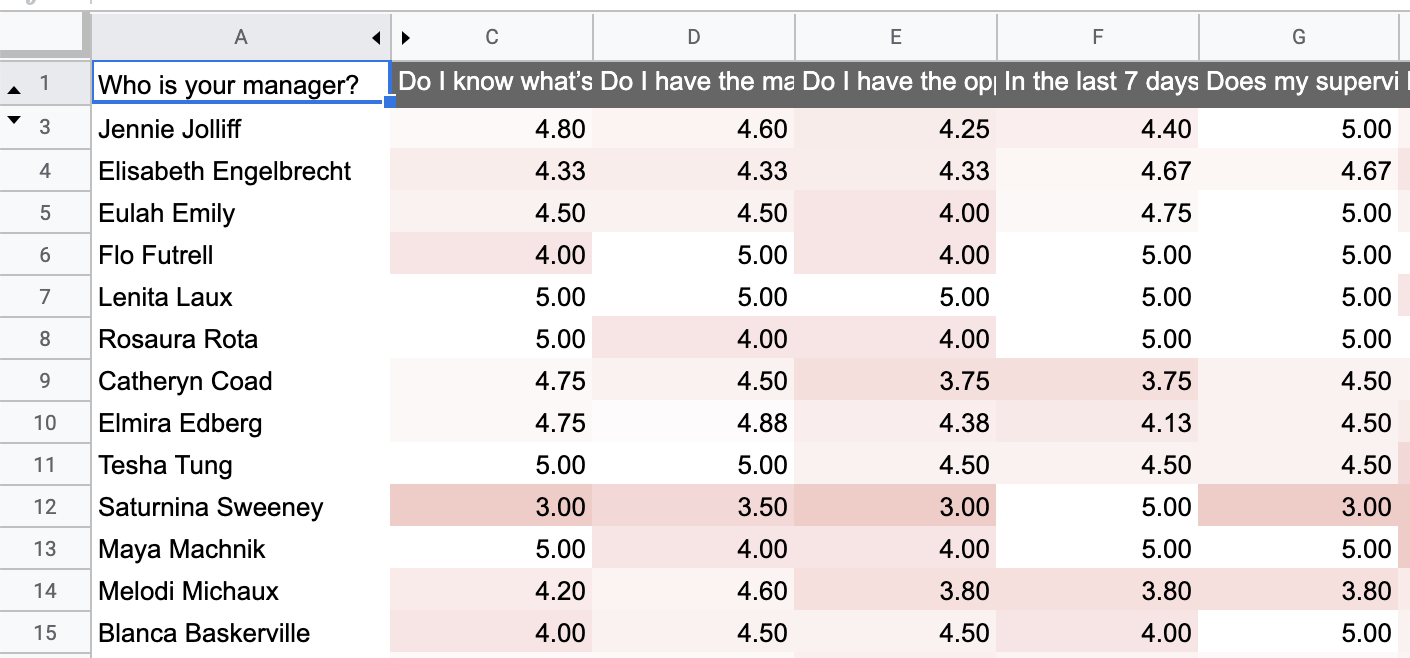If you have a goal you're working toward, the most effective way of making progress is to measure that goal and track your progress over time. When it comes to something as amorphous as management, though, how do you quantify it?
It turns out that you can track the level of employee engagement with 12 questions, and these questions work across any company and any industry. These questions are called the Gallup 12, created by the same company that does election polling, and have been tried and tested across thousands of businesses.
Now, are the results of this survey directly correlated with managers’ performance? No, there are lots of other variables (like the output of their team) that are very important to a manager's performance. That said, employee engagement is directly related to retention and productivity. Determining engagement across your team is a great way of seeing areas where you could improve.
The 12 questions are split into two parts, the first (esteem-needs) being the most important. Each question is scored 1 to 5, from strongly disagree to strongly agree, respectively.
The esteem-needs questions
- Do I know what’s expected of me at work?
- Do I have the materials and equipment I need to do my work right?
- Do I have the opportunity to do what I do best every day?
- In the last week, have you received recognition or praise for doing good work?
- Does my supervisor or someone at work care about me as a person?
- Is there someone at work who encourages my development?
The self-actualization questions
- At work, do my opinions seem to count?
- Does the mission or purpose of the company make me feel like my job is important?
- Are my coworkers committed to doing quality work?
- Do I have a best friend at work?
- In the last six months, has someone talked to me about my progress?
- This last year, have I had the opportunity at work to learn and grow?
How we survey
We ask everyone in the company to fill out an anonymous survey to provide answers to the above questions twice a year. Then we share the raw, anonymized results with each manager and discuss areas of improvement. Note that for smaller teams, anonymity is hard to accomplish.
Below is an example of a table pivoted off each manager. The score represents the mean result across their reports.

What to do with the results
An effective way of understanding how to improve the scores is to reverse the questions.
Esteem-needs questions reversed
- Do my team members have clear job descriptions and clarity around projects, tasks, and expectations?
- Does your team have the resources they need to succeed in their roles?
- Do you have the right people in the right jobs, where they can use and build their strengths? Learn what people do best, and how their passions are different.
- When was the last time you gave praise to the individuals on your team? If it wasn’t in the last week, it’s not regular enough. People crave recognition—your role as a manager is to encourage and cheer-lead your team.
- Do you know who your team members are as people, not as employees?
- Do you provide opportunities for your team to learn new skills and feel like they are moving forward?
Self-actualization questions reversed
- What structure do you have in place for your team members to provide their feedback? Do you listen when it’s given?
- Do your team members know how their role fits into the bigger picture?
- Are you letting poor performers set the standard, or are you encouraging people to lift the bar? Good performers can be demoralized if poor standards are accepted by others.
- Are you providing opportunities for your team to grow supportive relationships at work? Work is a big part of their lives, so it’s vital for people to have fun and friendship.
- Are you providing regular reviews and feedback to help people with a sense of direction at work?
- Are you providing opportunities for advancement?
How to improve
The most useful tool in your management arsenal is a one-on-one. Ask yourself the questions above, and then see how you can provide the support your team needs during their one-on-ones.
Are you setting clear expectations? Are you giving effective positive and critical feedback (see Feedback? Are you discussing wider career growth opportunities with your team and providing a clear path to advancement? Most importantly, have you really gotten to know your team on a deep and personal level?